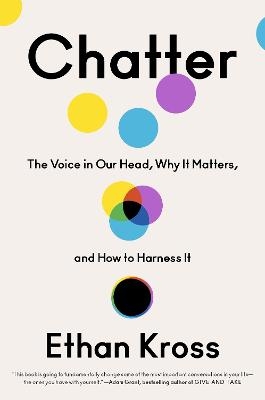
Chatter
Crown Publishing Group, Division of Random House Inc (Verlag)
978-0-593-23875-2 (ISBN)
A masterpiece. Angela Duckworth, bestselling author of Grit Malcolm Gladwell, Susan Cain, Adam Grant, and Daniel H. Pink s Next Big Idea Club Winter 2021 Winning Selection
One of the best new books of the year The Washington Post, BBC, USA Today, CNN Underscored, Shape, Behavioral Scientist, PopSugar Kirkus Reviews, Publishers Weekly, and Shelf Awareness starred reviews
Tell a stranger that you talk to yourself, and you re likely to get written off as eccentric. But the truth is that we all have a voice in our head. When we talk to ourselves, we often hope to tap into our inner coach but find our inner critic instead. When we re facing a tough task, our inner coach can buoy us up: Focus you can do this. But, just as often, our inner critic sinks us entirely: I m going to fail. They ll all laugh at me. What s the use?
In Chatter, acclaimed psychologist Ethan Kross explores the silent conversations we have with ourselves. Interweaving groundbreaking behavioral and brain research from his own lab with real-world case studies from a pitcher who forgets how to pitch, to a Harvard undergrad negotiating her double life as a spy Kross explains how these conversations shape our lives, work, and relationships. He warns that giving in to negative and disorienting self-talk what he calls chatter can tank our health, sink our moods, strain our social connections, and cause us to fold under pressure.
But the good news is that we re already equipped with the tools we need to make our inner voice work in our favor. These tools are often hidden in plain sight in the words we use to think about ourselves, the technologies we embrace, the diaries we keep in our drawers, the conversations we have with our loved ones, and the cultures we create in our schools and workplaces.
Brilliantly argued, expertly researched, and filled with compelling stories, Chatter gives us the power to change the most important conversation we have each day: the one we have with ourselves.
lt;b>Ethan Kross, PhD, is one of the world s leading experts on controlling the conscious mind. An award-winning professor in the University of Michigan s top ranked Psychology Department and its Ross School of Business, he is the director of the Emotion & Self Control Laboratory. He has participated in policy discussion at the White House, and has been interviewed about his work on CBS Evening News, Good Morning America, and NPR s Morning Edition. His pioneering research has been featured in The New York Times, The New Yorker, The Wall Street Journal, USA Today, New England Journal of Medicine and Science.
Chapter One
Why We Talk to Ourselves
The sidewalks of New York City are superhighways of anonymity. During the day, millions of intent pedestrians stride along the pavement, their faces like masks that betray nothing. The same expressions pervade the parallel world beneath the streets the subway. People read, look at their phones, and stare off into the great invisible nowhere, their faces disconnected from whatever is going on in their minds.
Of course, the unreadable faces of eight million New Yorkers belie the teeming world on the other side of that blank wall they ve learned to put up: a hidden thoughtscape of rich and active internal conversations, frequently awash with chatter. After all, the inhabitants of New York are nearly as famous for their neuroses as they are for their gruffness. (As a native, I say this with love.) Imagine, then, what we might learn if we could burrow past their masks to eavesdrop on their inner voices. As it happens, that is exactly what the British anthropologist Andrew Irving did over the course of fourteen months beginning in 2010 listened in on the minds of just over a hundred New Yorkers.
While Irving hoped to gain a glimpse into the raw verbal life of the human mind or rather an audio sample of it--the origin of his study actually had to do with his interest in how we deal with the awareness of death. A professor at the University of Manchester, he had done earlier fieldwork in Africa analyzing the vocalized inner monologues of people diagnosed with HIV/AIDS. Unsurprisingly, their thoughts roiled with the anxiety, uncertainty, and emotional pain produced by their diagnoses.
Now Irving wanted to compare these findings with a group of people who surely had their woes but weren t necessarily in aggrieved states to begin with. To carry this out, he simply (and bravely!) approached New Yorkers on the street and in parks and cafés, explained his study, and asked if they would be willing to speak their thoughts aloud into a recording device while he filmed them at a distance.
Some days, a handful of people said yes; other days, only one. It was to be expected that most New Yorkers would be too busy or skeptical to agree. Eventually, Irving gathered his one hundred streams of internally represented speech, as he described them, in recordings ranging from fifteen minutes to an hour and a half. The recordings obviously don t provide an all-access backstage pass to the mind, because an element of performance might have come into play for some participants. Even so, they offer an uncommonly candid window into the conversations people have with themselves as they navigate their daily lives.
As was only natural, prosaic concerns occupied space in the minds of everyone in Irving s study. Many people commented on what they observed on the streets--other pedestrians, drivers, and traffic, for example as well as on things they needed to do. But existing alongside these unremarkable musings were monologues negotiating a host of personal wounds, distresses, and worries. The narrations often landed on negative content with utterly no transition, like a gaping pothole appearing suddenly on the unspooling road of thought. Take, for example, a woman in Irving s study named Meredith whose inner conversation pivoted sharply from everyday concerns to matters of literal life and death.
I wonder if there s a Staples around here, Meredith said, before shifting, like an abrupt lane change, to a friend s recent cancer diagnosis. You know, I thought she was going to tell me that her cat died. She crossed the street, then said, I was prepared to cry about her cat, and then I m trying not to cry about her. I mean New York without Joan is just . . . I can t even imagine it. She started crying. She&rs
| Erscheinungsdatum | 16.01.2021 |
|---|---|
| Verlagsort | New York |
| Sprache | englisch |
| Maße | 141 x 210 mm |
| Gewicht | 278 g |
| Themenwelt | Sachbuch/Ratgeber ► Gesundheit / Leben / Psychologie ► Lebenshilfe / Lebensführung |
| Sachbuch/Ratgeber ► Gesundheit / Leben / Psychologie ► Psychologie | |
| Geisteswissenschaften ► Psychologie ► Allgemeine Psychologie | |
| Geisteswissenschaften ► Psychologie ► Verhaltenstherapie | |
| Naturwissenschaften ► Biologie ► Humanbiologie | |
| Naturwissenschaften ► Biologie ► Zoologie | |
| Schlagworte | Anxiety • anxiety books • brain • business books • Chatter • coaching books • Cognition • cognitive science • critical thinking • Daily Rituals • Decision Making • declutter your mind • Emotions • empath books • gifts for dad • gifts for men • gifts for mom • gifts for science lovers • gifts for women • health and wellness • inspirational books • language • leadership books • Memory • Mental Health • mental health books • Mind • Mindfulness • Motivational books • Neuropsychology • Neuroscience • Non-fiction • Non Fiction • nonfiction books • personal development books • Positive self talk • positive thinking • Productivity • Psychology • psychology books • relationships • science books • science gifts • self control • Self Help • Self-Help • self help books • self sabotage books • Self-talk • Stress • therapy books • wellness gifts |
| ISBN-10 | 0-593-23875-3 / 0593238753 |
| ISBN-13 | 978-0-593-23875-2 / 9780593238752 |
| Zustand | Neuware |
| Haben Sie eine Frage zum Produkt? |
aus dem Bereich


